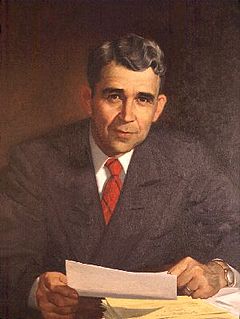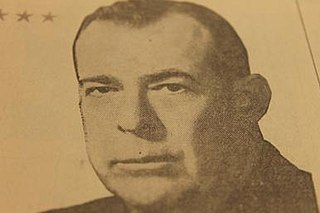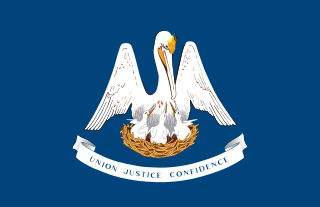
Thomas Overton Brooks was a Democratic U.S. representative from the Shreveport-based Fourth Congressional District of northwestern Louisiana, having served for a quarter century beginning on January 3, 1937.

Robert Floyd Kennon Sr., known as Bob Kennon, was the 48th Governor of Louisiana, serving from 1952 to 1956. From 1954 to 1955, he was chairman of the National Governors Association. In 1955, he was also the chairman of the Council of State Governments.
Paul Jude Hardy is an American attorney from Baton Rouge, in the U.S. state of Louisiana, who was the first Republican to have been elected lieutenant governor of the U.S. state of Louisiana since Reconstruction. He served in the second-ranking post under Governor Buddy Roemer from 1988 to 1992.

Sam Houston Jones was the 46th Governor of Louisiana for the term from 1940 to 1944. He defeated the renowned Earl Kemp Long in the 1940 Democratic runoff primary election. Eight years later, Long then in a reversal of 1940 defeated Jones in the 1948 party primary.

The Louisiana gubernatorial election of 1956 was held on January 17, 1956. The 1956 election saw the election of Earl K. Long to his second full term as Governor of Louisiana. He received over 50% of the vote, defeating his opponents so soundly that no runoff vote was needed.

The Louisiana gubernatorial election of 1963–64 was held in three rounds. The two Democratic Party primaries were held on December 7, 1963 and January 11, 1964. The general election was held on March 3, 1964. The 1964 election saw the election of John McKeithen as governor.

The Louisiana gubernatorial election of 1959–60 was held in two rounds on December 5, 1959, and January 9, 1960. After an election which featured some of the most racially charged campaign rhetoric in Louisiana political history, Jimmie Davis was elected to his second nonconsecutive term as governor after defeating the Republican candidate, Francis Grevemberg, in the general election.
Allison Ray Kolb was the Democratic auditor of Louisiana from 1952 to 1956, who angered many local officials in the pursuit of his job duties and was hence defeated by former Lieutenant Governor William J. "Bill" Dodd in the 1956 party primary. While he was a Democrat, Kolb was a part of the anti-Long faction in Louisiana politics.

The Louisiana gubernatorial election of 1928 was held on January 17, 1928. Like in most Southern states between the Reconstruction Era and the Civil Rights Movement, Louisiana's Republican Party was virtually nonexistent in terms of electoral support. This meant that the Democratic Party primary held on this date was the real contest over who would be governor.

The Louisiana gubernatorial election of 1932 was held on January 19, 1932. Like most Southern states between the Reconstruction Era and the Civil Rights Movement, Louisiana's Republican Party had virtually no electoral support. This meant that the Democratic Party primary held on this date was the real contest over who would be governor. The election resulted in the election of Oscar K. Allen as governor of Louisiana. Louisiana was one of only two states that held the election on a date other than the first Tuesday following the first Monday of November.

Wiley Douglas Fowler Sr., known as Doug Fowler, was a politician from rural Red River Parish in northwestern Louisiana, a loyal supporter of Governor Earl Kemp Long, and his state's chief elections officer from 1959, until declining health forced his retirement, effective December 31, 1979. Fowler laid the groundwork for a small-scale family political dynasty in Louisiana. Jerry Marston Fowler succeeded his father as elections commissioner and served until a scandal caused his own defeat, effective in 2000. And one of Fowler's two brothers, H.M. "Mutt" Fowler, went into local politics, served in the Louisiana House of Representatives for fourteen years and ended his public career, also amid a scandal, as the executive director of the Sabine River Authority in Many.

The Republican Party of Louisiana is the U.S. state of Louisiana's organization of the national Republican Party. The state chairman is Louis Gurvich, a businessman from New Orleans, who was elected on February 24, 2018. Since the late 20th century, white conservatives in the states have mostly shifted to the Republican Party from the Democratic Party. As of 2016, every statewide elected official in Louisiana, with the exception of the governor, is a Republican.

Clarence C. "Taddy" Aycock, a conservative Democrat from Franklin in St. Mary Parish, was the only three-term lieutenant governor in 20th century Louisiana history. He served from 1960 to 1972. Aycock failed in his only bid for governor in the 1971 Democratic primary. Few lieutenant governors in Louisiana have been elected directly to the governorship; former Governor Kathleen Babineaux Blanco of Lafayette, is a prominent exception.
Francis Edward Kennon, Jr., usually known as Ed Kennon, is a multi-millionaire Shreveport real-estate developer from Shreveport, Louisiana, who is a former member of the Louisiana Public Service Commission, the regulatory body for oil, natural gas, and utilities.

Ellen Bryan Moore was a pioneer of women in Louisiana politics, having served in the formerly elected office of "Register of State Lands" from 1952–1956 and 1960-1976. She served during World War II as a captain in the Women's Army Corps.

The Louisiana gubernatorial election of 1892 was held on April 19, 1892. Like most Southern states between Reconstruction and the civil rights era, Louisiana's Republican Party was virtually nonexistent in terms of electoral support. In addition, the Republican Party had split into two factions, each supporting a different candidate. As Louisiana had not yet adopted party primaries, this meant that the Democratic Party convention nomination vote was supposed to be the real contest over who would be governor. At the convention, pro-lottery former Governor Samuel D. McEnery was nominated. As a result of the nomination of a pro-lottery candidate, a group of anti-lottery Democrats nominated their own candidate, State Senator Murphy J. Foster. In addition to the four candidates already mentioned, the increasingly popular Populists nominated R. H. Tannehill and their candidate. Despite all of this, Senator Foster was elected with 45% of the vote with a comfortable 19% margin between him and McEnery, who placed second. This election marked the last time until 1979 that the official Democratic Party nominee was defeated.
Étienne Joseph Caire, I, , was a merchant, pharmacist, major sugar cane planter, and banker from Edgard in St. John the Baptist Parish, Louisiana. He ran in 1928 as the first Republican nominee for Governor of Louisiana in the 20th century when he challenged populist Democrat Huey Pierce Long Jr. He received only four percent of the vote. That year the Republican Party ran a slate of candidates for statewide offices for the first time since the late 19th century.
Robert Max Ross was a Republican activist and a candidate for numerous statewide and local offices who resided in Mangham in northeastern Louisiana. He was among the earliest advocates for the Republican political movement at a time when no GOP candidate had been elected statewide in more than a century. He ran as one of two candidates in the Republican primaries for governor in 1972 and Louisiana's 5th congressional district seat in 1974. After Louisiana adopted the jungle primary system, Ross qualified again for governor in 1983 and also the United States Senate in 1984. He additionally ran for the Louisiana State Senate as well as mayor of Mangham during other election years.














